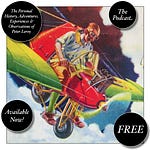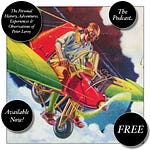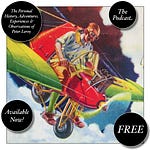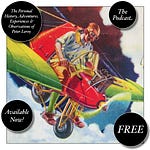“WELL, PETER, how was it?” my father asked that evening, calling me from the bathroom where he had been soaking his hands free of gasoline and grease from the gas station where he worked. This procedure had fascinated me since I had first seen it as a child. It produced iridescent swirls on the surface of the water in the sink. My original thought had been that this was its purpose, and that mistaken notion still interfered with my attaining a conventional understanding of washing up. As far as I was concerned, it was still playing with water.
“It was—”
I hesitated. What should I say? Confusing? Baffling? Scary?
My father dried his hands and started on his way out to the patio, where he was going to grill some pork chops.
“Exciting, I’ll bet,” he asserted. “Starting a new school year is always exciting.”
I was being invited to agree, I knew, but my father’s statement surprised me, because he had never been much of a student, and he had never hidden that fact from me. Something had gotten into him, and I was too young to know that it was nostalgia. He dumped charcoal into the grill, squirted lighter fluid onto it, and lit it. While it burned he grew reflective. From his distant, unfocused look, he might have been thinking of Ariane.
“The smell of new pencils,” he said eventually, as if something made him say it. “I always remember the smell of new pencils.”
He seemed to be choking up. He cleared his throat and wiped his eyes. He blew his nose.
“Damned smoke,” he said. He glanced at me to see if I accepted this explanation. I acted as if I did. “It’s funny—whenever I smell new pencils, I feel full of energy. I feel that I’m getting a new start.” He wore a wistful smile.
This was an awkward moment. I wasn’t accustomed to seeing emotion in my father. I didn’t know how to acknowledge it. I chose not to. It seemed best to say something, anything, so I started talking without thinking about what I was going to say. “In science—” I began, “I mean general science—we have—” I stopped. I had been going to say that we had a beautiful teacher, but I realized that it would be an inappropriate remark. My father, still wearing the wistful look induced by his memory of the odor of pencil shavings, was looking at me with unusual attention.
“Mm?” he said.
“—we have to answer the Big Questions,” I said, putting the capitals in as Miss Rheingold had.
“The big questions?” said my father. He seemed not to have heard the capitals.
“Yeah,” I said. “I’m in the where-do-you-stop group. Although actually I don’t know who else is in my group yet.”
“The what group?” my father asked.
“The group that has to answer the question ‘Where do you stop?’” I said.
“What does that mean?” he asked. He seemed annoyed. The happy memory of pencil shavings seemed to have been blown away by this Big Question.
“That’s the first thing we have to figure out. No—first we have to figure out who’s in our group. But that’s the second thing we have to figure out.”
“What is?”
“What it means.”
“Is this something special, Peter?” he asked. “Or is it part of your regular work?”
“It’s—um—I guess it’s something special,” I said. “We have regular work, too.”
“Well, just make sure that this when-do-you-stop business doesn’t interfere too much with your regular work.”
“Where.”
“What?”
“It’s where, not when.”
“Don’t get smart with me, Peter,” he said. “Where or when is not the point. Is it?”
“Well,” I said, “actually, I guess it is, or at least part of the point, because some of the other questions—”
“I mean that it is not the point of our little discussion here and now,” he said. “The most important thing is that you do the work that’s expected of you. You have a book to get through, don’t you?”
“Yes,” I said. “Adventures in General Science.”
“And you’re going to get regular assignments?”
“I guess.”
“Well,” he said, pointing at me with the barbecue fork, “you just make sure you do your regular work before you work on something extra. Now that you’re out of grade school, teachers are going to start asking a lot more of you, Peter. Do you know what I mean?”
“The work will get harder?” I guessed.
“Yes,” he said. “But that’s not all. You see, they have your records. They know you’re pretty smart. They know you did well in grade school. They’re liable to use you to make them look good. You know what I mean now?”
I couldn’t imagine how Miss Rheingold could be made to look any better than she already did, but if there was a way that she could use me in such a noble undertaking, yea, though it use me up completely, leaving me a dry and lifeless husk, spent in the task, I was ready to answer the call.
“Not really,” I said, truthfully.
“If they give you some special project to do,” he said, “and you do a good job, they’ll look good. Get it?”
“Well,” I said, “I guess so.”
Would Miss Rheingold do such a thing? Was that what she wanted from me? Was that why she had crossed her legs?
[to be continued]
Have you missed an episode or two or several?
You can begin reading at the beginning or you can catch up by visiting the archive or consulting the index to the Topical Guide. The Substack serialization of Little Follies begins here; Herb ’n’ Lorna begins here; Reservations Recommended begins here; Where Do You Stop? begins here.
You can listen to the episodes on the Personal History podcast. Begin at the beginning or scroll through the episodes to find what you’ve missed. The Substack podcast reading of Little Follies begins here; Herb ’n’ Lorna begins here; Reservations Recommended begins here; Where Do You Stop? begins here.
You can listen to “My Mother Takes a Tumble” and “Do Clams Bite?” complete and uninterrupted as audiobooks through YouTube.
You can ensure that you never miss a future issue by getting a free subscription. (You can help support the work by choosing a paid subscription instead.)
At Apple Books you can download free eBooks of Little Follies, Herb ’n’ Lorna, and Reservations Recommended.
You’ll find overviews of the entire work in An Introduction to The Personal History, Adventures, Experiences & Observations of Peter Leroy (a pdf document) and at Encyclopedia.com.














Share this post